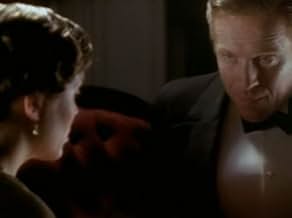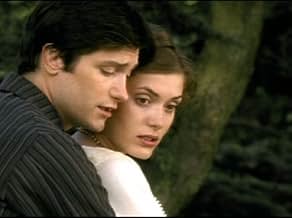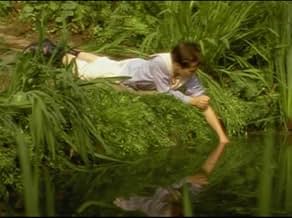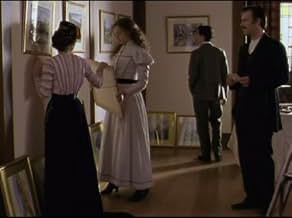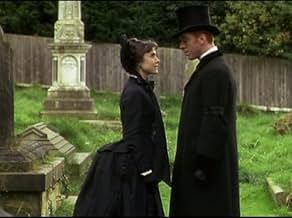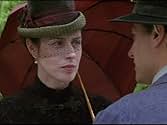Crónica de las vidas de tres generaciones de la familia británica de clase media alta, los Forsyte, desde la década de 1870 hasta 1920.Crónica de las vidas de tres generaciones de la familia británica de clase media alta, los Forsyte, desde la década de 1870 hasta 1920.Crónica de las vidas de tres generaciones de la familia británica de clase media alta, los Forsyte, desde la década de 1870 hasta 1920.
- Ganó 1 premio BAFTA
- 2 premios ganados y 4 nominaciones en total
Explorar episodios
Opiniones destacadas
The first series was so well wrought that I rushed out to buy the books, a set of three trilogies! As did the first, this second series brings the characters and story lines to life as though Galsworthy himself crafted the script. Once again, we trace the intertwined lives of Soames, Irene, Jolyon and their families as they mature and branch out. Damien Lewis builds upon his masterful portrayal of Soames, an emotionally repressed man bound by Victorian conventions, whilst others around him, including the irrepressible Freddie, enjoy the heady excitement of the decidedly unstuffy post-war era. I found most characters "aged" convincingly, although time, if not her fashionable appearance, seems to have stood still for June who now looks about the same age as her much younger sister, Holly. Overall, the continuity between the first and second series has been handled well. Much of the action in the books has been condensed whilst still remaining true to the plot (the same things happen, just not as drawn out). I am really enjoying the new characters who have been introduced: Jon, Fleur, Prosper Profond and Michael Mont. The actors are well cast and have done a marvellous job; the audience really cares what happens to them, regardless of whether we like them or not. None is all bad or all good, and we recognise our own human virtues and frailties in reflection.
I had never heard of The Forsyte Saga before seeing the mini-series but I enjoyed it so much that I bought the novel, and isn't that really what these adaptations of novels are all about- trying to interest people enough to read the book the movie was based on? I'm glad this version wasn't completely true to the novel considering that so many of the characters in the novel are either underdeveloped or so enigmatic that it's hard to have any kind of feelings about them.It was a stroke of genius to develop Dartie and George into the two jokers of the family, who provide light entertainment when the plot gets a little dark. In defense of Gina McKee, I think the choice to cast her as Irene was a wise one. I can't think of any other actress today who has such an elegant, classy beauty without being "showy" about it and I thought her characterization of Irene was true to how she is portrayed in the book, considering that Galsworthy deliberately made Irene a very shadowy, unreachable figure. Ioan Gruffudd, who, with his dark good looks just seems to be made for these lavish period pieces, was his usual dashing and charming self playing "The Buccaneer" and the rest of the cast put in a fine performance. While I admit these costume drama mini-series aren't to everyone's taste, you can not doubt the painstaking hard work put in by all involved that makes them a cut above the rest.
Comparisons between the 60s version of this splendid work and the latest one are difficult because they were both great. I have really enjoyed the last version especially as regards the performances of Damian Lewis and Gina McKee.
One previous contributor said that he found himself almost liking Soames which 'we were not supposed to do'. Is that right? Galsworthy intended The Forsytes to be representative of the upper middle class with some bad aspects - arrogance, lack of sentiment, conscious always of their respectability - but also with a positive side - sturdy, determined, ambitious, but ultimately concerned with ownership and property. Soames is an extreme example of his kind, to the extent that he regards people - especially his wife - as potential property. Irene, on the other hand, represents the new force which, along with the effects of WWI and the rise of the Welfare State, nationalisation etc will soon overthrow the old order.
Superficially at least, Soames is the villain. He appears to terrorise his wife, physically abuses her and more. However, is there another side to this? Irene marries him quite cynically for materialistic reasons. It's not merely a question of 'not loving' him. He positively makes her flesh creep right from the start. We are given the idea that she is forced to marry him by her stepmother and by her poverty. Force her?? As the story goes forward, we see that she is a strong character - no-one can force her to do anything. Her poverty? She has £50 per annum from her father. This might not seem a lot, but it was about what an artisan earned in a year at that time (on which he was expected to keep a family). Despite his treating her as property, Soames does love Irene in his way and he does try his best to give her what she wants. In return she is openly unfaithful to him, denies him children and even conjugal rights. As regards his bad treatment of her, she certainly returns the compliment in kind. She could be looked on as something of a vampire - she sucks the life force from Soames and old Jolyan and wantonly destroys the happiness of her friend June and Bossiney (though admittedly he goes along willingly). As regards her own son her hatred of Soames tempers her dislike of Fleur so even her son is badly affected by her force of character and neurosis.
I think Galsworthy, as well as writing a simple commentary on Edwardian and Victorian life was also trying to divide his readers into factions - the pro-Soames camp who like the old ways, and the pro-Irene (the 'new woman' camp) who wanted change.
Whatever, I have to congratulate Gina McKee. She carried off that complex character of Irene so well. Her enigmatic Mona Lisa smile, did it display goodness? Or the opposite? I'm still not sure
One previous contributor said that he found himself almost liking Soames which 'we were not supposed to do'. Is that right? Galsworthy intended The Forsytes to be representative of the upper middle class with some bad aspects - arrogance, lack of sentiment, conscious always of their respectability - but also with a positive side - sturdy, determined, ambitious, but ultimately concerned with ownership and property. Soames is an extreme example of his kind, to the extent that he regards people - especially his wife - as potential property. Irene, on the other hand, represents the new force which, along with the effects of WWI and the rise of the Welfare State, nationalisation etc will soon overthrow the old order.
Superficially at least, Soames is the villain. He appears to terrorise his wife, physically abuses her and more. However, is there another side to this? Irene marries him quite cynically for materialistic reasons. It's not merely a question of 'not loving' him. He positively makes her flesh creep right from the start. We are given the idea that she is forced to marry him by her stepmother and by her poverty. Force her?? As the story goes forward, we see that she is a strong character - no-one can force her to do anything. Her poverty? She has £50 per annum from her father. This might not seem a lot, but it was about what an artisan earned in a year at that time (on which he was expected to keep a family). Despite his treating her as property, Soames does love Irene in his way and he does try his best to give her what she wants. In return she is openly unfaithful to him, denies him children and even conjugal rights. As regards his bad treatment of her, she certainly returns the compliment in kind. She could be looked on as something of a vampire - she sucks the life force from Soames and old Jolyan and wantonly destroys the happiness of her friend June and Bossiney (though admittedly he goes along willingly). As regards her own son her hatred of Soames tempers her dislike of Fleur so even her son is badly affected by her force of character and neurosis.
I think Galsworthy, as well as writing a simple commentary on Edwardian and Victorian life was also trying to divide his readers into factions - the pro-Soames camp who like the old ways, and the pro-Irene (the 'new woman' camp) who wanted change.
Whatever, I have to congratulate Gina McKee. She carried off that complex character of Irene so well. Her enigmatic Mona Lisa smile, did it display goodness? Or the opposite? I'm still not sure
The screenwriter has once again decided to rewrite the story. Read the book (actually books) to find out all the differences. For example, in the book the governess leaves on her own & refuses any extra pay, Young Jolyon is seen visiting her flat & the gossip starts - that's when Jolyon's wife and father first learn anything is going on. The changes go on and on. If you have ever seen the 1967 version, it would be hard to beat Eric Porter as Soames.
I truly enjoyed this mini-series. I felt that Damian Lewis' portrayal of Soames was truly award-winning. After seeing him in other roles (most notably Band of Brothers), I am even more impressed with his range. I also don't agree with those who felt that the Irene' should have been played by a "prettier" actress. I felt that Gina McKee's true beauty was exposed once you looked at the person inside, exactly as Irene's was. I would recommend this to anyone!
¿Sabías que…?
- TriviaCorin Redgrave (Old Joleyn Forsyte) and Kika Markham (Mme Lamotte) were married in real life
- Citas
Soames Forsyte: You know nothing about it. Your friendship with her was a sham!
June: Yes! She stole the love of my life, my future. I should hate her but the alternative was you. I cannot hate her. I can only wonder why she did not do it sooner.
- ConexionesFeatured in The Best of Masterpiece Theatre (2007)
- Bandas sonorasIrene's Song
(End titles music)
Music by Geoffrey Burgon
Lyrics by Jacqueline Kroft
Performed by Bryn Terfel
Selecciones populares
Inicia sesión para calificar y agrega a la lista de videos para obtener recomendaciones personalizadas
- How many seasons does The Forsyte Saga have?Con tecnología de Alexa
Detalles
- Fecha de lanzamiento
- País de origen
- Sitios oficiales
- Idioma
- También se conoce como
- La saga de los Forsyte
- Locaciones de filmación
- Croxteth Hall, Muirhead Avenue East, West Derby, Liverpool, Merseyside, Inglaterra, Reino Unido(James and Emily's home)
- Productoras
- Ver más créditos de la compañía en IMDbPro
Contribuir a esta página
Sugiere una edición o agrega el contenido que falta








